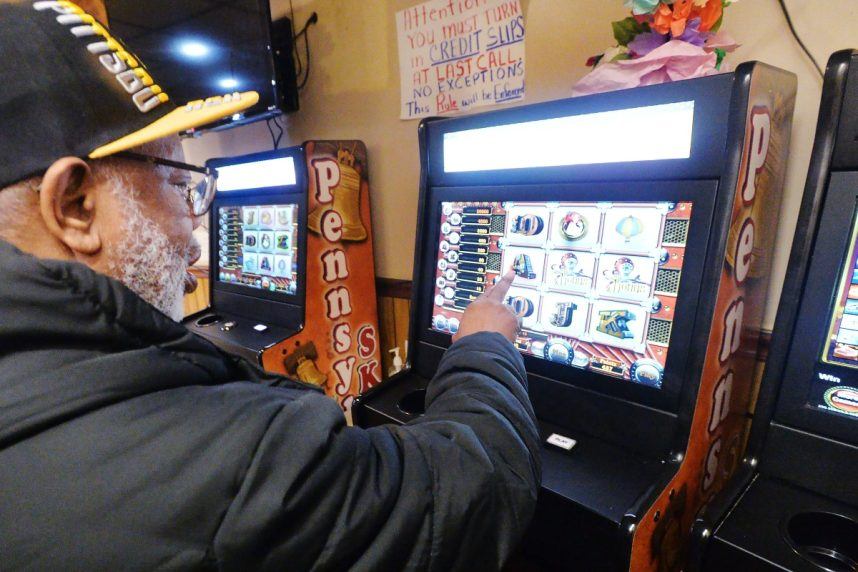- Pennsylvania skill game supporters are seeking regulation, with a fair tax
- Pennsylvania’s powerful casino industry opposes the unregulated games
Most proponents of skill games in Pennsylvania want a legal framework for the slot-like terminals, but they’re urging state lawmakers in Harrisburg not to enact an excessive tax that would hurt the many small businesses that currently benefit from housing the games.

Pace-O-Matic, or POM, is the primary driver of skill games in Pennsylvania. The Georgia-based software developer is partnered with Miele Manufacturing, a Pennsylvania-based corporation, in making and distributing the tabletop and cabinet terminals across the commonwealth. POM is additionally behind PA TAP, the Pennsylvania Tavern and Players Association.
PA TAP is a group consisting of many businesses, VFWs, American Legions, and social clubs that operate skill games. Commonly branded Pennsylvania Skill, the games look, sound, and function closely to a traditional slot machine found inside one of the state’s 17 brick-and-mortar casinos or many legal iGaming platforms.
Skill games differ in that they don’t have predetermined outcomes. That’s because the player can impact the machine’s payout by being able to identify winning paylines.
Another key differentiator is that unlike real slots, skill games aren’t regulated in Pennsylvania. The games also don’t share any of the machines’ gross revenue with the state. Many state lawmakers, including Gov. Josh Shapiro (D), want to change that.
Responsible Taxation
The skill gaming industry is seeking to be taxed in Pennsylvania to provide the market with stability and allow businesses and organizations that benefit from them to better count on the gaming revenue.
The highly regulated and taxed casino industry opposes skill games on claims that the machines cut into their slot business. They could have a point, as brick-and-mortar slot revenue has remained stagnant over the past four years despite additional casinos opening.
Still, state casinos won more than $2.44 billion in the 2024/25 fiscal year, the second-best year on record behind only FY22/23 at $2.45 billion. The Pennsylvania Lottery also opposes skill games, claiming the unregulated machines have cost “an estimated $200 million over the last five years.”
Shapiro is willing to authorize skill games, but he’s demanded a 52% state cut that nearly mimics the casino slot tax rate.
Every time somebody puts a buck into one of those unregulated machines, it undermines the lottery and the critical services it funds for our seniors like prescriptions and meals,” Shapiro said in February during his budget address.
Skill game proponents disagree. They say the games provide critical supplemental revenue to small businesses that have allowed them to stay in business, offset inflationary pressures, and keep people employed.
Skill games support Pennsylvania small businesses and fraternal organizations by providing additional revenue to supplement their traditional income base. For many businesses, these games have made it possible to recover from the income losses experienced during the pandemic, manage the increasing price of goods, and meet higher expected wages during the current labor shortage,” says PA Tap.
State Sen. Chris Gebhard (R-Lancaster) introduced legislation that would impose a 35% tax on skill games’ gross gaming revenue (GGR). Sens. Gene Yaw (R-Bradford) and Elder Vogel (R-Beaver) have sponsored a skill gaming measure that seeks a 16% tax but also comes with costly annual fees and per-machine fees. Neither bill has advanced out the Senate Community, Economic, and Recreational Development Committee.
During PA TAP’s rally last week, attendees told local media that the membership largely supports a fair tax rate of around 15% to 20%.
Skill Gaming Revenue Distribution
Under the unregulated model, the PA Tap website reveals how GGR from each skill game is typically distributed.
The association says the host business retains about 40% of the slot money, with 50% allocated for the Pennsylvania-based gaming manufacturer and distributor. POM receives 10%.
There’s estimated to be almost 80K skill games operating in Pennsylvania.
The post Pennsylvania Skill Game Proponents Rally in Hershey, Seek Fair Tax appeared first on Casino.org.






